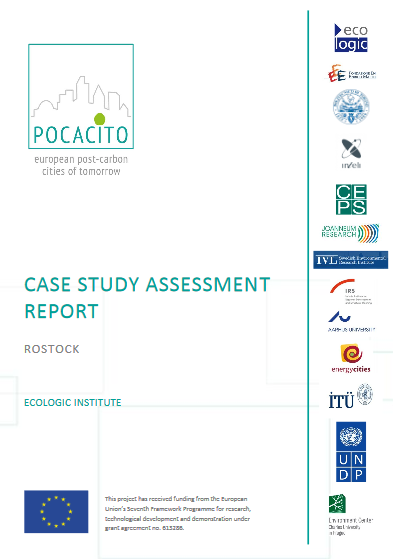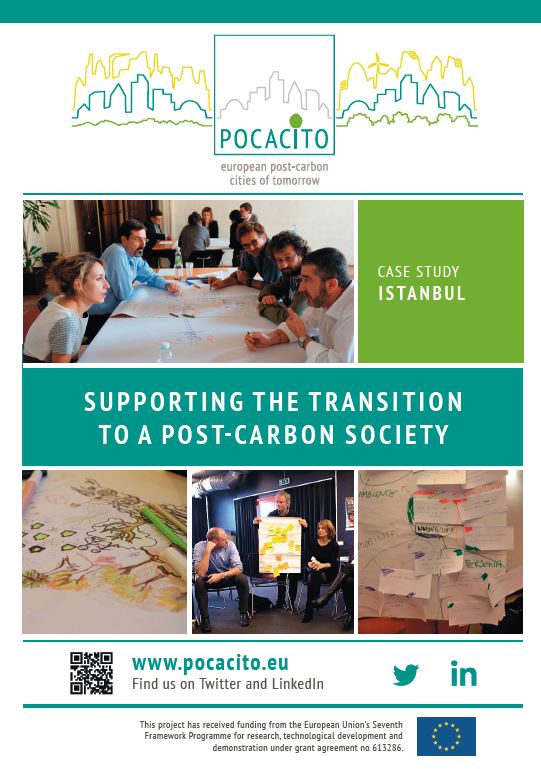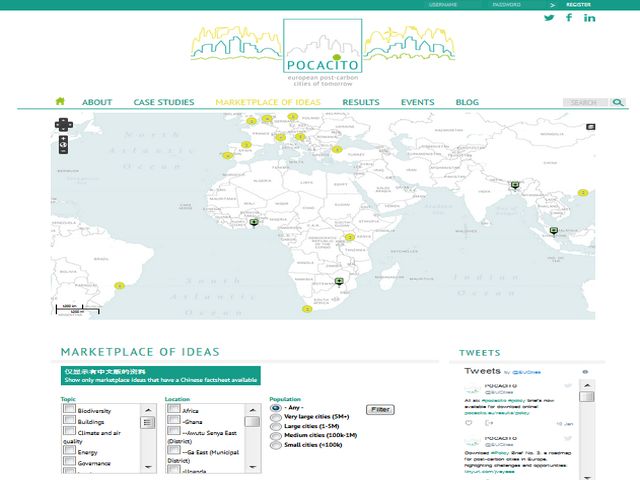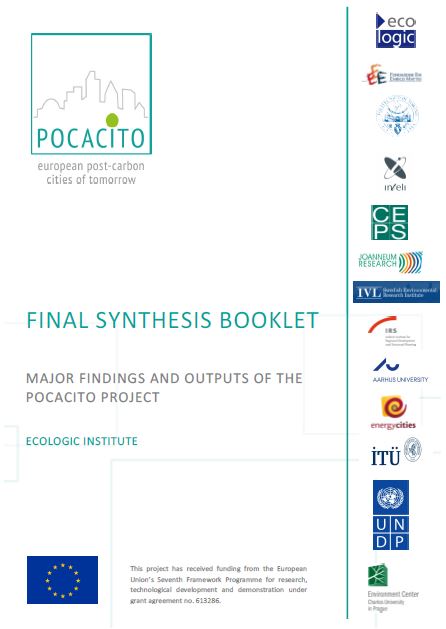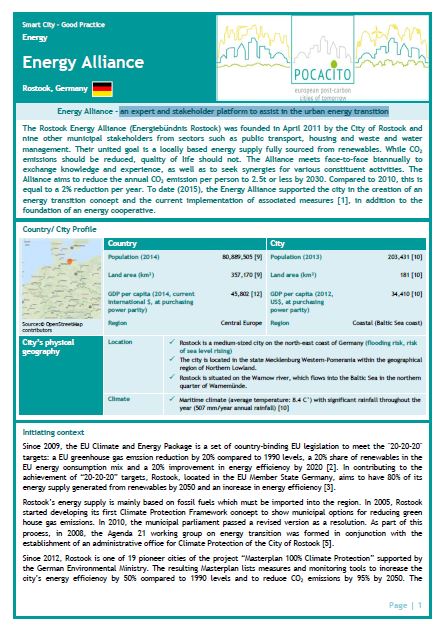Case Study Assessment Report – Rostock
- Publikation
- Zitiervorschlag
Albrecht, S., Schock, M. (2015): Individual Case Study Assessment Report - Rostock. European Union FP7: POCACITO - Post-carbon cities in Europe: A long-term outlook under the grant agreement n° 613286. WP3 Deliverable.
Der Assessment Report bietet eine Übersicht über die Hauptindikatoren der POCACITO (Post-Carbon Städte von Morgen) Fallstudie Rostock. Diese mittelgroße Stadt liegt in Zentraleuropa, an der deutschen Ostseeküste. Rostock ist ein regionales Zentrum und eine Küstenstadt. Der Assessment Report gibt einen Überblick über einige ihrer größten Herausforderungen und Chancen. Der Report diente im POCACITO Projekt bei Workshops zu Visionsentwicklung und Backcasting für eine Roadmap 2050 mit Vertreter/innen der Stadt als auch für Szenariomodellierungen zu Klimaanpassungsmaßnahmen von Rostock.
Die Daten wurden sowohl über die lokalen Behörden erhoben, insbesondere mit Hilfe des Umweltamt Rostock, als auch über statische Daten und andere relevante Dokumente. Eine wichtige Quelle war das “Statistisches Jahrbuch Hansestadt Rostock 2013”. Als Masterplankommune steht Rostock für 100% Klimaschutz und hat bereits viele relevante Daten erhoben.
- Sprache
-
Englisch
- Autorenschaft
-
Stefanie AlbrechtMichael Schock
- Finanzierung
-
Europäische Kommission, Generaldirektion Forschung & Innovation (GD Forschung & Innovation), International - Jahr
- Umfang
- 25 S.
- Projekt
- Projekt-ID
- Inhaltsverzeichnis
-
Gesamtes Inhaltsverzeichnis
I INTRODUCTION
II APPROACH AND METHODOLOGY
II.I MODEL AND CONCEPT
II.II DATA COLLECTION PROCESS
III OVERVIEW OF THE CASE STUDY CITY
III.I TERRITORY
III.II POPULATION
III.III ECONOMY
IV KEY STRATEGIES AND PROJECTS
IV.I STRATEGIES AND ACTION PLANS
IV.II KEY PROJECTS
V CASE STUDY CITY ASSESSMENT
V.I ENVIROMENTAL PERFORMANCE
V.I.I Variation rate of ecosystem protected areas
V.I.II Energy intensity variation rate
V.I.III Variation rate of energy consumption by sectors
V.I.IV Variation rate of carbon emissions intensity
V.I.V Variation rate of carbon emissions by sector
V.I.VI Exceedance rate of air quality limit values
V.I.VII Variation share of sustainable transportation
V.I.VIII Variation rate of urban waste generation
V.I.IX Variation rate of urban waste recovery
V.I.X Variation rate of water losses
V.I.XI Energy - efficient buildings variation rate
V.I.XII Urban building density variation rate
V.II SOCIAL PERFORMANCE
V.II.I Variation rate of unemployment level by gender
V.II.II Variation rate of poverty level
V.II.III Rate of tertiary education level by gender
V.II.IV Variation rate of average life expectancy
V.II.V Variation rate of green space availability
V.II.VI Existence of monitoring system for emissions reductions
V.III ECONOMIC PERFORMANCE
V.III.I Level of wealth variation rate
V.III.II Variation rate of GDP by sectors
V.III.III Variation rate of employment by sectors
V.III.IV Variation rate of business survival
V.III.V Variation rate of budget deficit
V.III.VI Variation rate indebtedness level
V.III.VII Variation rate R&D intensity
VI FINDINGS AND KEY CHALLENGES
VII RECOMMENDATIONS
VIII CONCLUSIONS - Schlüsselwörter
-
Rostock, Deutschland
Grünig, Max und Philipp Voß 2016: Final Synthesis Booklet. Major Findings and Outputs of the POCACITO Project. Ecologic Institut: Berlin.
Ecologic Institut 2014: European Post-Carbon Cities of Tomorrow – POCACITO. URL: http://pocacito.eu/
Monica Ridgway; Beáta Vargová (2014): Supporting the Transition to a Post-carbon Society - POCACITO-Posterserie. Poster. Berlin: Ecologic Institut.
Post-fossile Zukunftsstädte in Deutschland (POCACITO in Deutschland)
- Dauer
-
-
- Finanzierung
-
KfW Entwicklungsbank (KfW), Deutschland Bundesministerium für Wirtschaft und Energie (BMWi), Deutschland
Workshop:Post-Carbon-Städte und die Neuerfindung des städtischen Raumes - ein ELEEP-POCACITO Workshop
- Datum
-
- Ort
- Washington, DC, Vereinigte Staaten von Amerika
